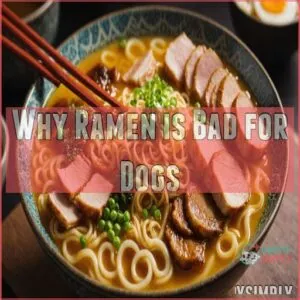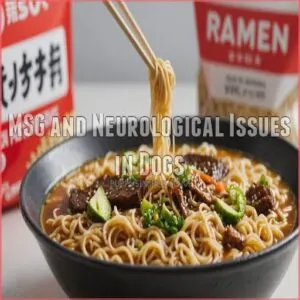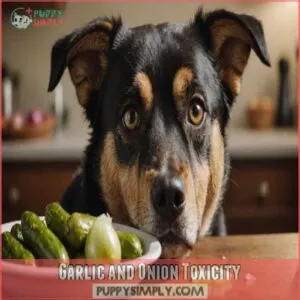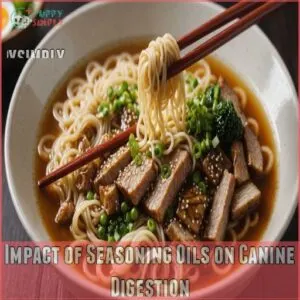This site is supported by our readers. We may earn a commission, at no cost to you, if you purchase through links.
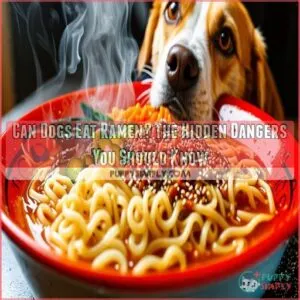 You might wonder if dogs can eat ramen, especially when they’re giving you those big, hopeful eyes.
You might wonder if dogs can eat ramen, especially when they’re giving you those big, hopeful eyes.
While sharing food is tempting, ramen isn’t the best treat.
It’s loaded with sodium and unhealthy seasonings, which can spell trouble for your dog’s health.
Think of it like offering them a salty snack they just don’t need.
The carbs and empty calories add nothing to their diet, and potential allergens could lead to even more problems.
So, next time you’re slurping those noodles, remember—your dog’s better off with a carrot stick.
Curious about more dog-friendly foods? We have some great ideas for you!
Table Of Contents
- Key Takeaways
- Why Ramen is Bad for Dogs
- Harmful Effects of Ramen on Canine Health
- Frequently Asked Questions (FAQs)
- Can dogs eat instant ramen?
- Is it healthy to have ramen noodles?
- Can dogs eat ramen noodles?
- Can dogs eat organic Ramen?
- What happens if a dog eats too much Ramen?
- Why does my dog have kidney failure after eating ramen?
- Can a dog eat noodles?
- Can dogs eat chicken instant noodles?
- Can dogs have soy sauce ramen?
- Can dogs eat pasta with butter?
- My dog ate ramen, is he okay?
- Are all ramen noodles harmful?
- Can I give my dog broth?
- What are safe ramen alternatives?
- How much ramen is too much?
- Conclusion
Key Takeaways
- Ramen’s high sodium and seasonings like onion and garlic are risky, potentially causing serious health issues for your dog.
- Even plain ramen noodles offer empty calories and carbs, leading to weight gain without nutritional benefits.
- Allergens like soy and wheat in ramen can trigger stomach problems or allergic reactions in dogs.
- Better treat your dog with healthy snacks like carrot sticks or apples, keeping them safe and happy.
Why Ramen is Bad for Dogs
While ramen might be your go-to comfort food, it’s not the best choice for your dog.
Packed with too much sodium, harmful seasonings, and hard-to-digest carbs, ramen can wreak havoc on your furry friend’s health.
High Levels of Sodium
When thinking about your dog’s health, it’s important to understand sodium’s impact.
Ramen is loaded with sodium, which spells trouble for canine health, and can also lead to hypernatremia and electrolyte imbalance as explained in why ramen is bad for dogs.
Too much can cause dehydration, upset stomachs, and even heart issues.
Monitoring sodium intake helps avoid these canine health risks.
Unsafe Seasonings
Surprisingly, those ramen seasoning packets hold more hazards for dogs than you’d think.
They typically contain toxic ingredients like onion and garlic powder, causing red blood cell damage.
MSG dangers are real, sparking neurological troubles.
Toss in sodium toxicity from high sodium intake, and you’ve got a recipe for disaster.
Better to sprinkle your pup’s meal with alternative seasonings instead.
Unhealthy Carbs & Empty Calories
After sidestepping those dangerous seasonings, think about the carbs in ramen.
They’re not just empty calories but serious weight-gain culprits.
To find the best dog food for your pup, check out a detailed guide to dog food reviews, which can help you make informed choices.
Dogs munching on ramen might resemble tiny fluffy potatoes on legs!
Opt for dog food that’s rich in fiber and nutrients.
Healthy dog treats like carrots or apple slices can be satisfying and keep your furry buddy in top shape.
Allergy Trigger
So, you’ve learned about the carb overload in ramen.
Now, let’s talk allergies.
Ramen often contains soy and wheat, common allergens for dogs.
These can cause upset stomachs, skin problems, or even a serious reaction like anaphylaxis.
Think of it as a hidden danger lurking in those yummy-looking noodles!
Always check ingredients, and if your pup has allergies, steer clear.
Knowing your dog’s sensitivities is key to keeping them safe and happy.
Harmful Effects of Ramen on Canine Health
If you’ve ever considered sharing ramen with your furry friend, it might be time to rethink that plan.
Besides stomach issues, ramen can lead to neurological harm and even toxic reactions that could leave you and your dog in a real pickle.
MSG and Neurological Issues in Dogs
You mightn’t know it, but MSG in ramen isn’t just a flavor booster—it’s a potential threat to your dog’s brain health.
This additive can spark unusual dog behavior, leading to MSG toxicity symptoms like neuro damage.
You don’t want your pup to experience restlessness or neurological issues, do you?
Keep their dog nutrition solid by avoiding toxic ingredients for dogs.
Garlic and Onion Toxicity
Indeed, with MSG wreaking havoc, garlic and onion in ramen aren’t far behind.
These ingredients can be toxic for dogs, leading to severe health issues.
Watch for:
- Vomiting and diarrhea.
- Weakness or lethargy.
- Red blood cell damage.
- Long-term anemia concerns.
Switch to onion-free dog treats, as some human foods like hot dogs contain toxic ingredients such as garlic powder and onion powder that can harm your dog. Switch to onion-free dog treats for safety and keep your pup happy and healthy.
Impact of Seasoning Oils on Canine Digestion
Imagine your dog’s stomach as a finely tuned engine.
Tossing seasoning oils into it’s like using the wrong fuel.
These oils can hinder fat absorption and cause digestive issues, impacting dog health negatively.
While sharing ramen might seem harmless, it’s best to avoid it.
Instead, stick to dog nutrition advice for their digestive health to keep that engine purring smoothly.
Allergenic Ingredients in Ram
So you’ve probably heard how ramen’s seasoning oils can wreak havoc on Fido’s tummy.
But let’s not forget the sneaky allergens lurking in those noodles.
If you’re considering making dog ramen, you can find ingredients specifically designed for canine health at dog ramen ingredient suppliers online like dog ramen ingredients.
With ingredients like soy and wheat, ramen poses risks
Frequently Asked Questions (FAQs)
Can dogs eat instant ramen?
Feeding dogs instant ramen is like giving them a ticket to tummy troubles.
It’s packed with sodium and harmful seasonings like garlic and onion, which can harm their health.
Stick to dog-friendly treats for a healthy pup!
Is it healthy to have ramen noodles?
Ramen noodles can be a quick comfort food, but they’re not the healthiest choice.
They’re high in sodium and low in nutrients, making them more of an occasional treat than a diet staple.
Enjoy responsibly!
Can dogs eat ramen noodles?
Dogs need only 15 mg of sodium per kilogram.
Ramen noodles are like salt grenades packed with hard-to-digest ingredients.
These noodles can lead to health issues, making them a risky choice for your furry pal.
Can dogs eat organic Ramen?
Even though it’s organic, ramen’s still a no-go for your pup.
It’s high in sodium and might contain toxic ingredients like garlic or onion.
Stick to dog-friendly treats, letting your pooch avoid a salty snafu!
What happens if a dog eats too much Ramen?
Feeding your dog too much ramen noodles seems like a generous treat, but it actually risks salt poisoning, vomiting, diarrhea, and dehydration.
The unhealthy ingredients can cause weight gain and serious health issues.
Better stick to healthy canine snacks!
Why does my dog have kidney failure after eating ramen?
Your dog’s kidney failure might be due to ramen’s high sodium and toxic seasonings like garlic and onion, which cause kidney distress.
Prompt vet consultation is very important.
Keep ramen away to guarantee your pup stays healthy and safe.
Can a dog eat noodles?
Plain cooked noodles, without seasonings, are okay as an occasional treat. But, too much salt or garlic is bad news for your pup’s tummy. Always check with your vet first!
Can dogs eat chicken instant noodles?
Instant chicken noodles aren’t safe for dogs.
They’re loaded with sodium, unhealthy carbs, and spices like onion and garlic, which are toxic to dogs.
Instead, try offering plain cooked noodles or consult your vet for alternatives.
Can dogs have soy sauce ramen?
Feeding dogs soy sauce ramen is like giving a fish sandal lessons—it doesn’t make sense.
The high sodium and toxic ingredients like garlic or onion aren’t safe for dogs, leading to potential health issues and discomfort.
Can dogs eat pasta with butter?
Sure, your dog can nibble on some plain pasta with butter occasionally.
But watch out for tummy troubles!
Too much fat can cause problems for your furry friend, like pancreatitis.
Always serve treats in moderation.
My dog ate ramen, is he okay?
If your dog just had some ramen, watch for signs like vomiting, lethargy, or any allergic reactions.
Keep an eye out; if anything seems off, a quick call to the vet is a smart move.
Are all ramen noodles harmful?
Ramen noodles might seem harmless, but they’re not dog-friendly.
Most contain hazardous ingredients like garlic and onion.
Even plain noodles, with their high sodium and starch, aren’t ideal.
A balanced diet keeps your pup wagging happily!
Can I give my dog broth?
You can give your dog broth, but it should be low-sodium and free from onions, garlic, and other toxic ingredients.
Homemade is best, as it lets you avoid harmful additives while keeping your furry friend happy and healthy.
What are safe ramen alternatives?
Don’t get your tail in a twist!
Safe alternatives for your pup include plain cooked rice, oatmeal, or even some cooked veggies.
These are much easier on their tummy than ramen.
How much ramen is too much?
A single bite for a dog might seem harmless, but ramen’s high sodium and risky seasonings make it trouble in a bowl.
Even small amounts aren’t safe.
Better stick to dog-friendly snacks that keep tails wagging.
Conclusion
Surprisingly, over 60% of pet owners admit to giving human food to their dogs, but regarding "can dogs eat ramen," the answer’s a clear no.
Ramen packs a punch of sodium and harmful seasonings that aren’t friends with your dog’s health.
Sure, those noodles look tempting, but they offer nothing but trouble for your pet.
Stick to safer snacks like carrot sticks.
It’s time to make smarter, healthier choices for your furry friend.
- https://www.healthline.com/nutrition/ramen-noodles
- https://www.fda.gov/food/nutrition-education-resources-materials/sodium-your-diet
- https://www.akc.org/expert-advice/nutrition/is-salt-bad-for-dogs/
- https://www.petmd.com/dog/conditions/cardiovascular/c_dg_hypernatremia
- https://vcahospitals.com/know-your-pet/onion-garlic-chive-and-leek-toxicity-in-dogs

